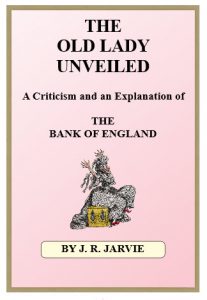THE OBJECT OF THIS BOOK is to awaken the public to the truth that the Bank of England, commonly believed to be the most disinterested and patriotic of the nation’s institutions, has been since its foundation during the reign of William of Orange a private and long-sustained effort in lucrative mumbo jumbo, and that it is in these days under! international control, serving foreign nations better on occasion than it serves England.
As a preliminary to the writing of such a book, one generally undertakes a certain amount of research work on well-defined and easily followed lines. If, for example, one wished to find out all there is to be known about Barclays Bank, one would first of all search the records at Somerset House or at the registered offices of the company.
There would be no difficulty in unearthing such important information as the names of the shareholders, the amount each has invested, the real capital of the company subscribed in cash as against the proportion, if any, that has been “watered” by the capitalisation of profits, the total amount of profits earned and the present financial position of the concern.
Resolutions affecting the policy of the bank, its scope and powers and their amendment from time to time, would be set forth in the files as required by the limited companies acts, which also lay down that these shall be open for inspection by the public.
Research affecting the Bank of England is not quite so simple. The investigator is blocked at every turn. There are no files of the Bank of England at Somerset House. Since it is not a limited company, but operates under Parliamentary charters, it has no registered offices and therefore no place where by law its accounts may be scrutinised.
Enquiry at the Bank itself has negative results, unless the enquirer has more than usual persistence. Then he will doubtless have the positive satisfaction of being ejected by minions in uniforms as impressive and official seeming as those garbing the posse from the Brigade of Guards which watches over the sterling virtues of the Old Lady of Threadneedle Street throughout the hours of night.
Here is a reply, dated January 18th, 1933, to a written enquiry:
“In reply to your recent letter I have to inform you as follows:
(1) The list of stockholders published by the Bank is for internal use and is available to Proprietors of Bank Stock only.
(2) The Bank have no statutes or. Articles of Association, their constitution being based upon a Charter of 1694 and various Acts of Parliament, of which the chief is that of 1844.
I may mention that a Statistical Summary, compiled by the Bank of England, has recently been made available at an inclusive charge of 12s. per annum, payable in advance.
RONALD DALE, Secretary.”
And that is as far as the Bank is prepared to assist those who may have the temerity to be interested in its affairs. The Statistical Summary, of course, confines itself mainly to the note issue and the Bank reserves, and this information is in any case published weekly in the London Gazette. The Summary gives away no secrets.
